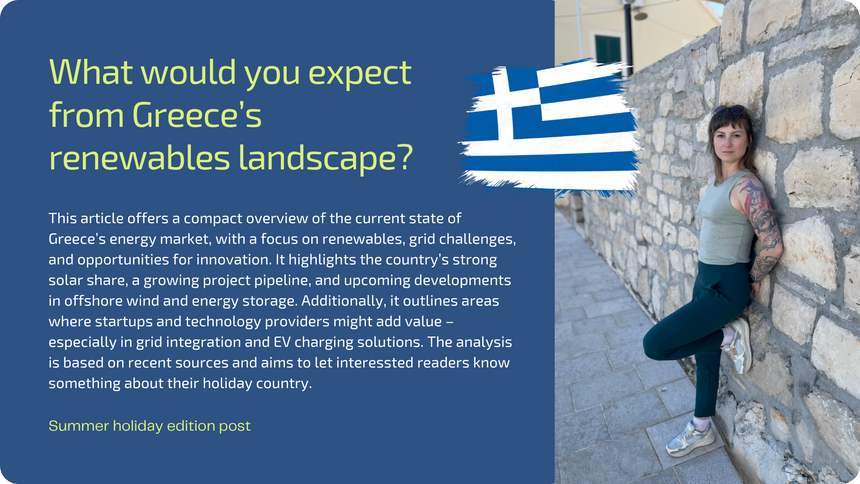That’s the question I asked myself before I started researching.
I hadn’t looked into the Greek energy market before. I knew it as a sunny, windy country, which seemed ideal for renewables. So I expected high solar capacity and possibly some offshore wind. And I was curious: if I were a startup, what kind of solution would I bring to this market?
The share of PV was as expected.
According to Statista about 23 percent of the electricity available in Greece comes from solar. These are 60 percentage of installed renewable energy there (Electricity maps). But offshore wind? There is none yet, despite strong wind resources and an estimated potential of 40 gigawatts. To be fair, onshore wind capacity is already in place, with 5.4 gigawatts installed.
Why is the share of PV already that high?
Since 2009, Greece has offered subsidies and even a feed-in tariff for solar. Although these subsidies were cut during the 2013 financial crisis, the funding environment has been improving again since 2017. In 2024, for example, a support scheme for rooftop PV combined with storage was launched with a funding volume of 238 million euros.
Like in many other countries, grid operators in Greece are struggling to balance supply and demand. In fact, renewable energy plants are already being curtailed when demand is low. Some sources also point to a rapidly growing project pipeline. There are currently 10.7 gigawatts of PV and wind projects with confirmed grid connection offers. An additional 23 gigawatts are awaiting approval.
The grid is not yet able to accommodate this growth.
Still, Greece has set ambitious targets and aims to become a green electricity exporter by 2035, planning to export around 3.5 terawatt-hours.
As for offshore wind, it is still at an early stage. According to Euronews, Greece plans to install 12 gigawatts over the next 20 years. The first 2 gigawatts are scheduled to begin construction around 2028, near Crete. Because of deep waters in the Aegean Sea, floating turbines are being considered. This is a promising approach, although the technology is still evolving.
Storage is another area where there is clear potential.
Only 0.7 gigawatts of battery capacity are currently online. However, the government has opened the market for 4.7 gigawatts in 2025. This could lead to significant growth, particularly for co-located PV and storage projects that help stabilise the grid.
I also looked into e-mobility.
Greece is working to modernise its vehicle fleet and charging infrastructure. In cities such as Athens and Thessaloniki, specific targets have been set for emission-free mobility, including a carbon-neutral bus fleet. To support this transition, Greece plans to install 25,000 public charging points by 2030, funded in part by the EU. According to a study by P3, the current charging infrastructure is still basic, and the user experience requires improvement.
So back to my original question.
If I were a startup entering the Greek market, what would I focus on?
According to the German-Greek Chamber of Industry and Commerce, the most promising areas currently include storage technologies, battery systems, heat pumps, and intelligent solutions for grid and load management.
Personally, I would also see potential in improving the user experience for EV charging. Both software and hardware providers may find interesting opportunities here.
I hope you found this summary helpful.
If you have insights to add or see things differently, I’d be glad to discuss.
